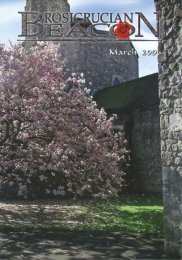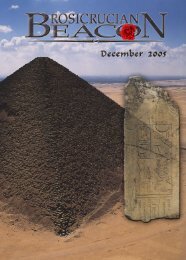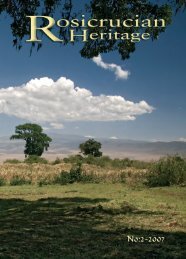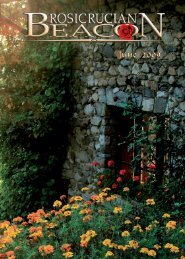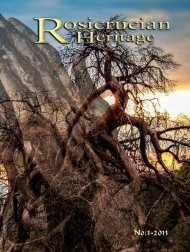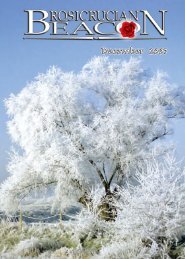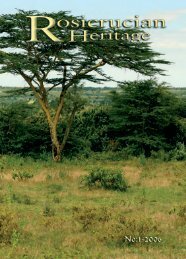Rosicrucian Beacon Online - 2012-12 - AMORC
Rosicrucian Beacon Online - 2012-12 - AMORC
Rosicrucian Beacon Online - 2012-12 - AMORC
You also want an ePaper? Increase the reach of your titles
YUMPU automatically turns print PDFs into web optimized ePapers that Google loves.
The Corpus Hermeticum,<br />
1st edition in Latin, 1463.<br />
[Source: http://mikemcclaughry.<br />
wordpress.com/]<br />
manuscript copies before the first printed edition,<br />
demonstrating that Islam was certainly a direct<br />
influence on the 13 th century revival. However,<br />
research into other early European alchemical<br />
documents has shown that Byzantine texts such as<br />
the early Latin Turba Philosophorum (‘Assembly of<br />
Alchemical Philosophers’),<br />
and many purely technical<br />
manuals such as the Mappae<br />
Clavicula, the Compositiones<br />
ad Tingenda (‘the Lucca<br />
manuscript’), <strong>12</strong> as well as the<br />
work of Magister Salernus,<br />
Theophilus the Monk, and<br />
Heraclius’ De Artibus Romanorum, all of them <strong>12</strong> th<br />
century or earlier, also exercised an important<br />
influence upon the 13 th century revival.<br />
Thirteenth century alchemists such as Roger<br />
Bacon, Albertus Magnus, Avicenna, Vincent<br />
of Beauvais, Bartholomeus Anglicus and their<br />
followers, were essentially encyclopaedists<br />
of earlier sources. Except for Bacon, they are<br />
theoreticians rather than laboratory technicians.<br />
Their work is really part of the much larger revival<br />
of Aristotle that took place throughout the new<br />
European universities formed during the <strong>12</strong> th and<br />
13 th centuries. The key sources for these alchemists<br />
were precisely these Latin and Arabic recipe<br />
books, rather than the genuine Hermetic corpus.<br />
The few fragments of Alexandrian doctrine from<br />
© Supreme Grand Lodge of <strong>AMORC</strong><br />
“The Renaissance revival<br />
of hermetic alchemy was<br />
essentially brought about<br />
through Ficino’s translation<br />
of the Corpus Hermeticum.”<br />
Egypt that seeped into Europe<br />
via Islam and Byzantium<br />
were far less important to<br />
the 13 th century revival than<br />
Theophilus and Heraclius<br />
and the indigenous European<br />
recipe-book tradition.<br />
Thus, when we come to<br />
the first translation of the<br />
surviving Greek texts of the<br />
Hermetic corpus into Latin by Marsilio Ficino<br />
(1433-99) in the 15 th century, we can understand<br />
why the European intellectual community was<br />
so eager to have direct access to the whole<br />
Hermetic corpus in its original language. All<br />
that had previously existed were fragments and<br />
pseudo-fragments such as<br />
the Revelations of Morienus.<br />
The humanist search for a<br />
universal religion is visible<br />
in both Pico de Mirandola<br />
(1463-94) and Ficino. 13 They<br />
tend to quote Moses, Jesus,<br />
Pythagoras, Plato, Hermes<br />
and Zoroaster all in the same breath, on the basis<br />
that they all referred to a single, secret, ancient<br />
wisdom. The Hermetic corpus was seen as the<br />
purest expression of this tradition, and in it the<br />
humanist philosophers hoped to find the true<br />
origin of Christianity.<br />
The Renaissance revival of hermetic alchemy,<br />
as opposed to the recipe-book alchemy of the<br />
13 th and 14 th centuries, was certainly due in large<br />
part to the availability of Ficino’s translation of the<br />
corpus, yet the survival of the recipe-book tradition<br />
into later alchemy and chemistry was mainly<br />
ascribable to the efforts of the extraordinary Swiss<br />
doctor and alchemist, Paracelsus. 14 Much in the<br />
manner of the Oriental alchemists, he shifted his<br />
attention away from the transmutation of metals<br />
6<br />
<strong>Rosicrucian</strong> <strong>Beacon</strong> <strong>Online</strong>


